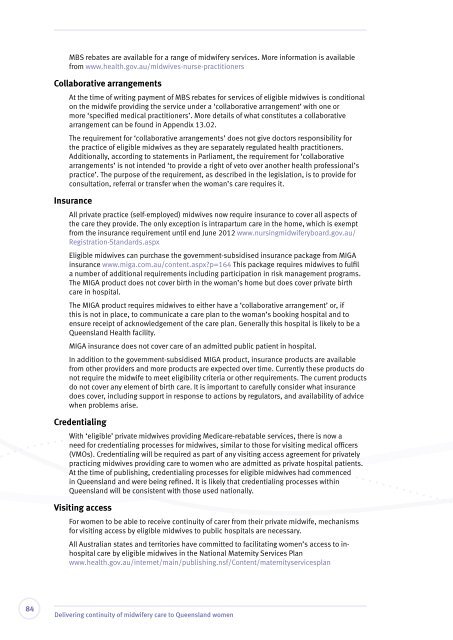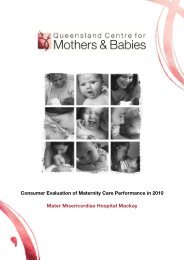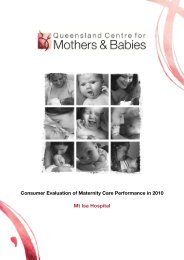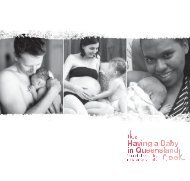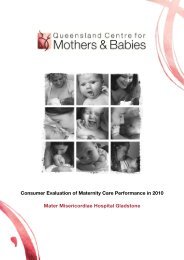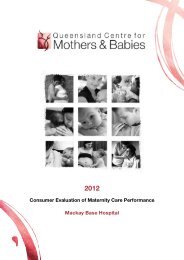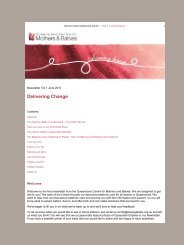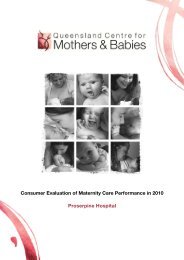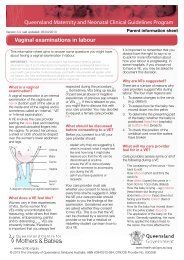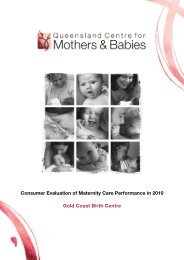Delivering continuity of midwifery care to Queensland women
Delivering continuity of midwifery care to Queensland women
Delivering continuity of midwifery care to Queensland women
You also want an ePaper? Increase the reach of your titles
YUMPU automatically turns print PDFs into web optimized ePapers that Google loves.
MBS rebates are available for a range <strong>of</strong> <strong>midwifery</strong> services. More information is available<br />
from www.health.gov.au/midwives-nurse-practitioners<br />
Collaborative arrangements<br />
At the time <strong>of</strong> writing payment <strong>of</strong> MBS rebates for services <strong>of</strong> eligible midwives is conditional<br />
on the midwife providing the service under a ‘collaborative arrangement’ with one or<br />
more ‘specified medical practitioners’. More details <strong>of</strong> what constitutes a collaborative<br />
arrangement can be found in Appendix 13.02.<br />
The requirement for ‘collaborative arrangements’ does not give doc<strong>to</strong>rs responsibility for<br />
the practice <strong>of</strong> eligible midwives as they are separately regulated health practitioners.<br />
Additionally, according <strong>to</strong> statements in Parliament, the requirement for ‘collaborative<br />
arrangements’ is not intended ‘<strong>to</strong> provide a right <strong>of</strong> ve<strong>to</strong> over another health pr<strong>of</strong>essional’s<br />
practice’. The purpose <strong>of</strong> the requirement, as described in the legislation, is <strong>to</strong> provide for<br />
consultation, referral or transfer when the woman’s <strong>care</strong> requires it.<br />
Insurance<br />
All private practice (self-employed) midwives now require insurance <strong>to</strong> cover all aspects <strong>of</strong><br />
the <strong>care</strong> they provide. The only exception is intrapartum <strong>care</strong> in the home, which is exempt<br />
from the insurance requirement until end June 2012 www.nursing<strong>midwifery</strong>board.gov.au/<br />
Registration-Standards.aspx<br />
Eligible midwives can purchase the government-subsidised insurance package from MIGA<br />
insurance www.miga.com.au/content.aspxp=164 This package requires midwives <strong>to</strong> fulfil<br />
a number <strong>of</strong> additional requirements including participation in risk management programs.<br />
The MIGA product does not cover birth in the woman’s home but does cover private birth<br />
<strong>care</strong> in hospital.<br />
The MIGA product requires midwives <strong>to</strong> either have a ‘collaborative arrangement’ or, if<br />
this is not in place, <strong>to</strong> communicate a <strong>care</strong> plan <strong>to</strong> the woman’s booking hospital and <strong>to</strong><br />
ensure receipt <strong>of</strong> acknowledgement <strong>of</strong> the <strong>care</strong> plan. Generally this hospital is likely <strong>to</strong> be a<br />
<strong>Queensland</strong> Health facility.<br />
MIGA insurance does not cover <strong>care</strong> <strong>of</strong> an admitted public patient in hospital.<br />
In addition <strong>to</strong> the government-subsidised MIGA product, insurance products are available<br />
from other providers and more products are expected over time. Currently these products do<br />
not require the midwife <strong>to</strong> meet eligibility criteria or other requirements. The current products<br />
do not cover any element <strong>of</strong> birth <strong>care</strong>. It is important <strong>to</strong> <strong>care</strong>fully consider what insurance<br />
does cover, including support in response <strong>to</strong> actions by regula<strong>to</strong>rs, and availability <strong>of</strong> advice<br />
when problems arise.<br />
Credentialing<br />
With ‘eligible’ private midwives providing Medi<strong>care</strong>-rebatable services, there is now a<br />
need for credentialing processes for midwives, similar <strong>to</strong> those for visiting medical <strong>of</strong>ficers<br />
(VMOs). Credentialing will be required as part <strong>of</strong> any visiting access agreement for privately<br />
practicing midwives providing <strong>care</strong> <strong>to</strong> <strong>women</strong> who are admitted as private hospital patients.<br />
At the time <strong>of</strong> publishing, credentialing processes for eligible midwives had commenced<br />
in <strong>Queensland</strong> and were being refined. It is likely that credentialing processes within<br />
<strong>Queensland</strong> will be consistent with those used nationally.<br />
Visiting access<br />
For <strong>women</strong> <strong>to</strong> be able <strong>to</strong> receive <strong>continuity</strong> <strong>of</strong> <strong>care</strong>r from their private midwife, mechanisms<br />
for visiting access by eligible midwives <strong>to</strong> public hospitals are necessary.<br />
All Australian states and terri<strong>to</strong>ries have committed <strong>to</strong> facilitating <strong>women</strong>’s access <strong>to</strong> inhospital<br />
<strong>care</strong> by eligible midwives in the National Maternity Services Plan<br />
www.health.gov.au/internet/main/publishing.nsf/Content/maternityservicesplan<br />
84<br />
<strong>Delivering</strong> <strong>continuity</strong> <strong>of</strong> <strong>midwifery</strong> <strong>care</strong> <strong>to</strong> <strong>Queensland</strong> <strong>women</strong>


